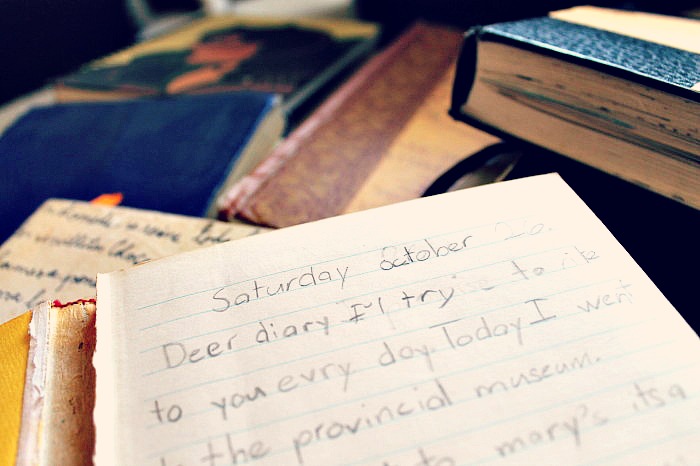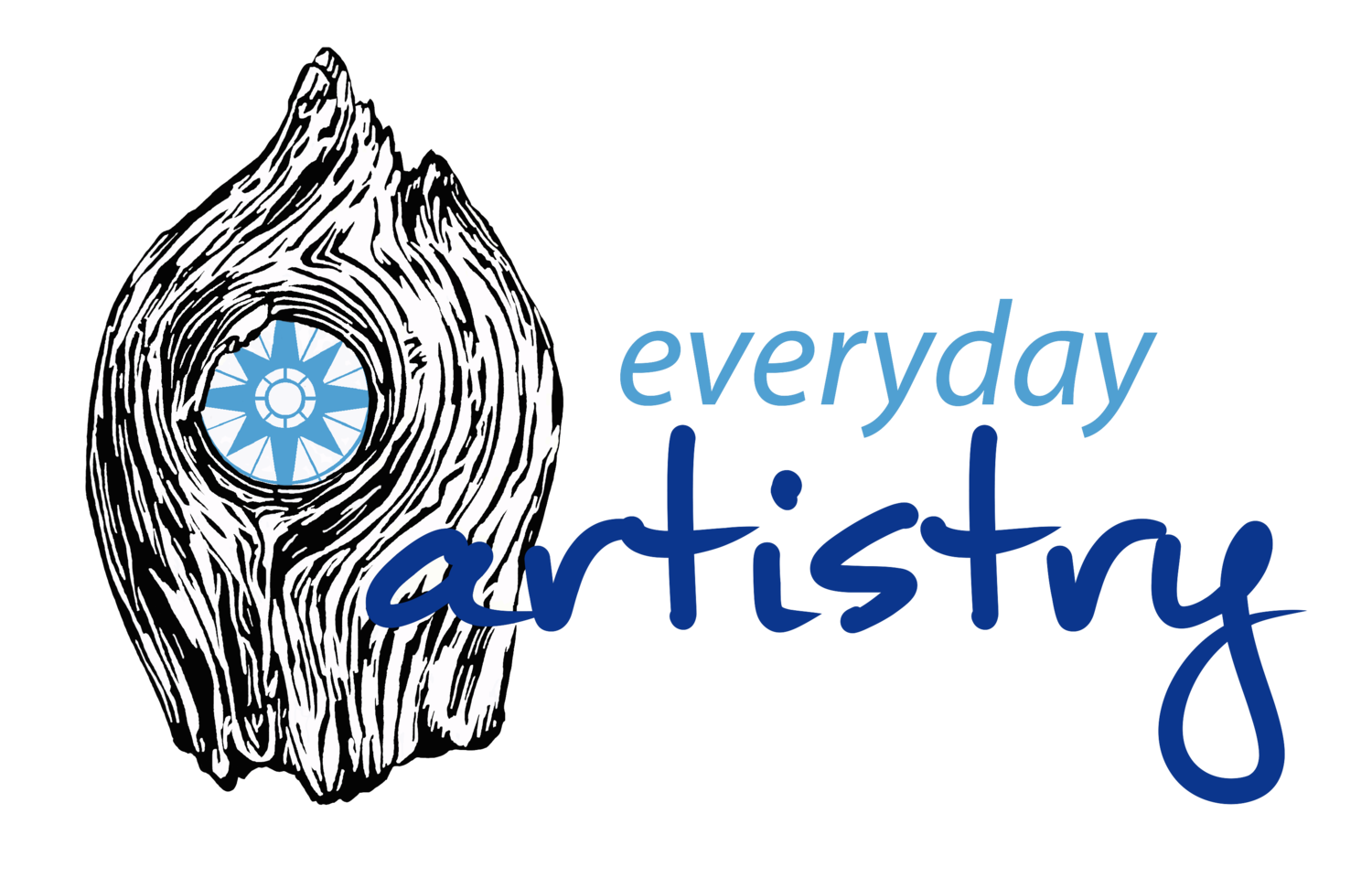Whether it's a massive shift in understanding or just a small flash of insight, epiphanies feel pretty good.These moments are rare, and that's what makes them magical, but do we have to wait around until something randomly bursts through the clouds? Or can we cultivate an environment where epiphanies are more likely? I think we can and lately I've been trying to figure out how. Here's what I've come up with so far.
What I've learned in 22 years of keeping a journal
 I have been keeping a journal of some kind since I was around 8 years old. I have always been afraid that if I didn't write things down my life would fade away from me and I would be left with nothing. My record-keeping has evolved over the years from a strict diary of daily events, to a dumping ground for negative emotions and self-hatred, to colourful experiments with poetry and drawing, to a record of my growth and progress and a celebration of life. I've gone from writing every day, to every week, to once a month, to everything in between.
I keep my diverse collection of books in a Rubbermaid bin that I drag from one home to another, and though I can't bear to read some of them, I wouldn't dream of letting them go. Without these books I honestly think I would be lost. They keep me in touch with myself and with all my past versions, and they constantly give me something to aspire to. Without these books holding me accountable to myself, I imagine that I would drift aimlessly through life with no intention or goals.
I have been keeping a journal of some kind since I was around 8 years old. I have always been afraid that if I didn't write things down my life would fade away from me and I would be left with nothing. My record-keeping has evolved over the years from a strict diary of daily events, to a dumping ground for negative emotions and self-hatred, to colourful experiments with poetry and drawing, to a record of my growth and progress and a celebration of life. I've gone from writing every day, to every week, to once a month, to everything in between.
I keep my diverse collection of books in a Rubbermaid bin that I drag from one home to another, and though I can't bear to read some of them, I wouldn't dream of letting them go. Without these books I honestly think I would be lost. They keep me in touch with myself and with all my past versions, and they constantly give me something to aspire to. Without these books holding me accountable to myself, I imagine that I would drift aimlessly through life with no intention or goals.
If it sounds pretty dramatic, that's because it is. These books are my lifeline. They hold my wisdom and my mistakes, my triumphs and my failures, my joys and my sorrows. They ARE me. Writing about what I've learned about journaling is sort of like writing about what I've learned about life. It's a big topic. With that said here are some things I've discovered in my journeys through journals:
1. Keep track of the good times. One of my primary goals is to write about everything good that happens, and everything that I want to remember. Lately I've taken to simply writing a list at the end of every month: I spent time with this person, I tried this exciting activity, I read this amazing book, I learned this important new lesson. For our first anniversary I made a zine for my boyfriend, with each page being a record of my favourite shared memories from each month of our relationship. Thanks to my journal I was able to recall these memories with ease.
This year I started a self-care journal where I write down, every day, the things I did that made me feel good and the things that I'm grateful for. When things aren't going so well this record helps remind me that I am doing okay and that life is actually quite lovely.
2. Keep track of what you learned from the bad times. As a teenager I use to write about every miserable little feeling that I had (and at that age I had a lot) so books from these years are filled with drama and whining. When I do dare to crack one of these books, they make me grateful that I grew up. Lately my strategy has been to hold off on writing about a negative situation until I can get some perspective on it and give myself some advice for dealing with similar situations in the future. This makes it feel like a constructive activity, rather than self-indulgent.
3. Use the right book, and the right pen. I don't mean to stress you out, but this is a very important decision. The book needs to be portable, yet sturdy. I stopped buying coil notebooks because the coil will collapse after being crushed a few dozen times in my bag, making it hard to open. It needs to lie flat, and be stable enough to be used on my lap, or on the ground. The paper needs to have the right texture for what I want to do with it. On my South American trip I found I did the most drawing in a square hardcover book with slightly rough pages. Something felt so right about drawing on those pages, whereas the book I bought when I finished it barely got used. I will spend an hour in a stationary store feeling the pages, holding the books in my hand, imagining how I will use it. I would recommend blank pages, as they're more versatile and you can pack more in, but lined pages definitely have their place.
If I do get a lined book, I use a plain ballpoint pen. But my blank journals call for something a little more decadent. A gel pen flowed across the pages of my last book, while a fine-tipped Sharpie scratched across the one before that. I can't say this enough: it has to feel right. I has to feel like the most natural combination, like something you can't wait to pick up again. If I find that journaling has become a chore, sometimes getting a nicer pen is all it takes to get me going again.
4. Don't discriminate. Record everything. When I'm traveling I am the best at journaling. I write down snippets of conversation or overheard exclamations, I describe my surroundings in great detail, I sketch what I see, I record all five senses, and I write about what I'm learning - about myself and about the world. I basically pack the pages full of wonder and curiosity, and joy. And when I'm at home... I occasionally remember to write about dinners with friends and special date nights. But those times when I do bring my journal everywhere and use it religiously, I can feel my life expanding and becoming infinitely richer. I pay closer attention, I feel more attuned to the different textures of my life. And these journals are the ones that I love going back to, to be inspired and to remind myself of what it feels like to be fully present and alive.
5. Play. Since I've started trying to make a living making art I often forget about playing with writing or with art, though as a child and early teen, that's all I ever did in my spare time. I have books full of poems, attempts at non-fiction, drawings, paintings, and other assorted bits and pieces. Lately I have to remind myself to write about an adventure longhand - to try to squeeze some juice from my experiences - or to illustrate my emotions, or to make a collage to help me remember a dream or an event. It's important to create for the sake of creating, without an audience in mind, and the journal is the perfect place for these adventures since it is a solitary place with no critics and no judgement. It is the best venue to try something new, to experiment.
Keeping a journal is one of my most important creative practices, no matter how intermittent it may be. Writing about it has me feeling inspired and excited: I can't wait to open a new book and start recording.
Have you ever kept a journal? What did you love most about it? If you've tried to keep one and given up on it, what was your biggest challenge? Leave a comment below!

